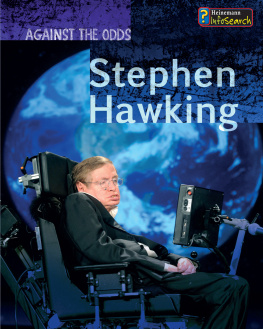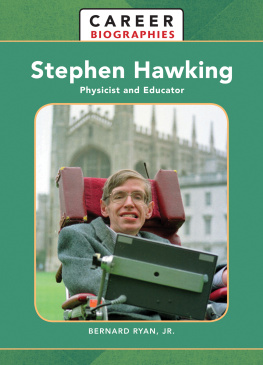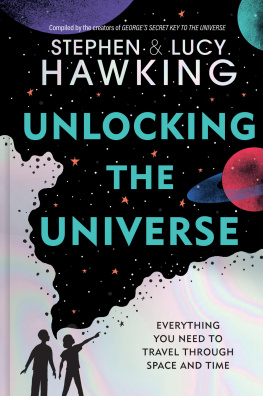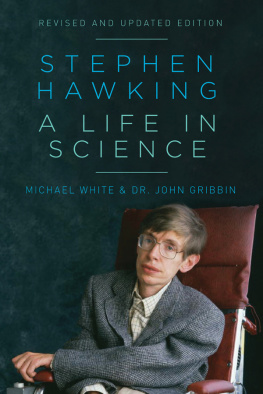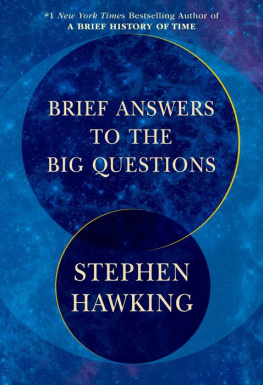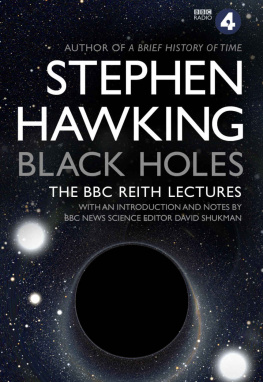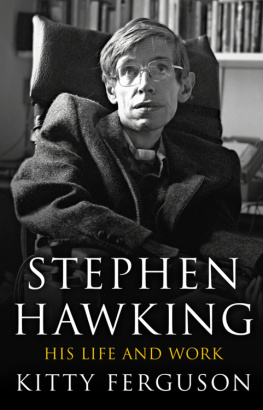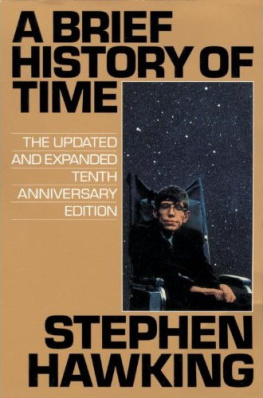Ferguson Kitty - Stephen Hawking
Here you can read online Ferguson Kitty - Stephen Hawking full text of the book (entire story) in english for free. Download pdf and epub, get meaning, cover and reviews about this ebook. year: 2019, publisher: Pavilion Books, genre: Non-fiction. Description of the work, (preface) as well as reviews are available. Best literature library LitArk.com created for fans of good reading and offers a wide selection of genres:
Romance novel
Science fiction
Adventure
Detective
Science
History
Home and family
Prose
Art
Politics
Computer
Non-fiction
Religion
Business
Children
Humor
Choose a favorite category and find really read worthwhile books. Enjoy immersion in the world of imagination, feel the emotions of the characters or learn something new for yourself, make an fascinating discovery.
- Book:Stephen Hawking
- Author:
- Publisher:Pavilion Books
- Genre:
- Year:2019
- Rating:5 / 5
- Favourites:Add to favourites
- Your mark:
- 100
- 1
- 2
- 3
- 4
- 5
Stephen Hawking: summary, description and annotation
We offer to read an annotation, description, summary or preface (depends on what the author of the book "Stephen Hawking" wrote himself). If you haven't found the necessary information about the book — write in the comments, we will try to find it.
Stephen Hawking — read online for free the complete book (whole text) full work
Below is the text of the book, divided by pages. System saving the place of the last page read, allows you to conveniently read the book "Stephen Hawking" online for free, without having to search again every time where you left off. Put a bookmark, and you can go to the page where you finished reading at any time.
Font size:
Interval:
Bookmark:


In 1988, the photo of a scholarly-looking gentleman in a wheelchair appeared on the cover of a new book, A Brief History of Time. No one could have predicted the books enormous success, or that the face on the cover would soon be familiar worldwide.
Stephen Hawking, whose books and documentaries would lead us into black holes and to the origin of the universe, drew multitudes to his lectures, from Beijing to Cambridge to California. Leaders of governments and science awarded him medals. The media followed him like a rock star. He suffered from a debilitating disease that is usually fatal in two or three years, yet he survived triumphantly to the age of 76. His ashes were interred in Westminster Abbey.
How did an unexceptional schoolboy from St Albans become Lucasian Professor of Mathematics at Cambridge and one of the most inspiring figures of the twentieth and twenty-first centuries? How did he accomplish all he did in spite of the physical destruction of motor neurone disease, able to communicate only by choosing words from a computer screen by moving his cheek?
The story is incredible, but it isnt fiction.

In 1983, Hawking was a familiar and easily recognizable figure in the streets of Cambridge and the College courts, but he was not yet an international celebrity.
In January 1942, with wartime bombs falling on London, it seemed wise to Dr Frank Hawking and his wife Isobel, living in Highgate, for her to move to Oxford for the birth of their first child. The son born there on 8 January was christened Stephen William. When the boy was eight, his father became head of the Division of Parasitology at the National Institute for Medical Research, and the family moved to St Albans. By that time Stephen had two younger sisters. He had not yet learned to read.
A curious child
The Hawkings spent the summers of Stephens childhood in a field at Osmington Mills, on the Dorset coast. They travelled there in an old London black taxi cab with a table added between the back seats for the children to play games while they drove. Once arrived, they camped in a ramshackle gypsy caravan and a large tent. In what had once been smuggler territory, the children explored the rocky beach, and Stephen discovered fossils that first awoke in him a sense of wonder for life on Earth.
Far from city lights, the boy watched the stars something he would love to do all his life. With his sisters he clambered over rocks and raced across fields and beach, with no idea that his days of climbing and running were numbered... no hint of the tragedy that lay ahead, or of the courage he would need to face it. Beginning in his early twenties, he would slowly but inexorably lose his ability to move or speak and be left physically helpless, silent and frozen, slumped in a wheelchair. That fragile figure is now familiar to millions as an intellectual giant of our contemporary world and among the bravest and most inspiring of its men and women.

The rocky coast of Dorset, where the Hawking family spent summers when Stephen was a child, had once been smuggler territory.

Stephen later said he was grateful that he had a normal, healthy, active childhood before the onslaught of motor neurone disease in his early twenties.
Between the boy of the Osmington beach summers and the Cambridge graduate student of the early 1960s, locked in a deteriorating body, there were years of growing up in St Albans and as an undergraduate at Oxford. As a schoolboy Stephen was no prodigy. He bothered to learn only what interested him and what he thought useful, and was ranked in the lower half of his class. It was a very bright class, he later claimed. What did interest him was taking things apart to find out how they worked, mathematics, and building a computer with friends and a favourite teacher. Some at St Albans School recognized that within this mediocre little scholar lurked an interesting mind.
TRIBUTE TO A TEACHER
Hawking wrote of a teacher at St Albans school: His classes were lively and exciting. Everything could be debated. Thanks to Mr Dikran Tahta, I am a professor of mathematics at Cambridge When each of us thinks about what we can do in life, chances are we can do it because of a teacher.
Casually inviting disaster
Stephen surprised them all, and his parents, by his sterling performance in entrance exams and interviews for Oxford. However, once there, reading physics as an undergraduate at University College, his slipshod study habits continued. Hawking later calculated he had spent an average of one hour a day studying: about one thousand hours in three years (195962) at Oxford.
The chief accomplishments of this casually arrogant, popular young man seemed to be as cox of a college boat, and the occasional show-off remark in a tutorial. In his third year, however, he found himself navigating into deeper waters. He was getting clumsy. He had an unexplained fall down stairs. He was also facing exams that would determine his future.
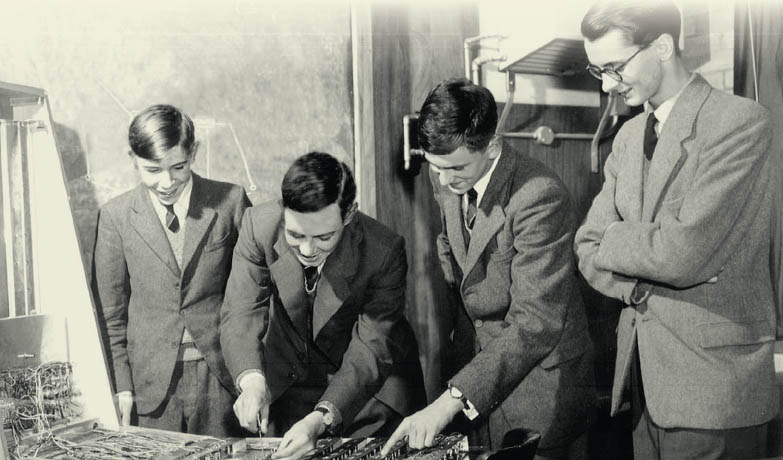
Stephen (left) and his friends at St Albans School built a remarkable computer that they called LUCE: Logical Uniselector Computing Engine.
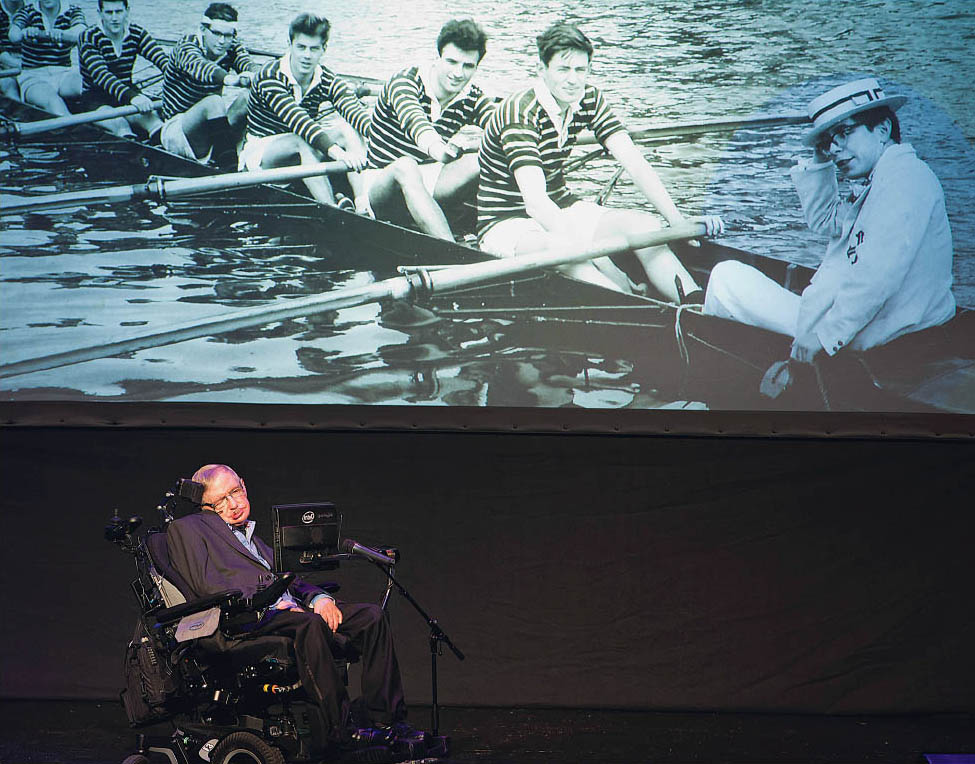
Stephens light, wiry build, commanding voice, quick intelligence, and fondness for being in control made him an ideal cox of a college boat at Oxford.
Where did the universe come from?
Stephen had decided he wanted to work in theoretical physics, specifically cosmology, feeling (as he told the New York Times in January 1983) that [cosmology] really did seem to involve the big question: Where did the universe come from?
Cambridge had accepted him for PhD research, conditional on a First Class degree from Oxford. This was no sure thing. His exam results were borderline, and he was summoned for a personal interview or viva. His future in the balance, Stephen produced the kind of off-the-cuff remark well known to his friends: If I get a First, I shall go to Cambridge. If I receive a Second, I will remain at Oxford. So I expect that you will give me a First.
TO WORK OR NOT TO WORK
In Hawkings A Brief History of Time: A Readers Companion, Oxford fellow-student, Gordon Berry, remembers: We just didnt apply ourselves. And Steve was right down there in not applying himself. Im not proud of this lack of work, Hawking wrote, Im just describing my attitude at the time, which I shared with most of my fellow students: an attitude of complete boredom and feeling that nothing was worth making an effort for. One result of my illness has been to change all that: when you are faced with the possibility of an early death, it makes you realize that life is worth living, and that there are lots of things you want to do.
Font size:
Interval:
Bookmark:
Similar books «Stephen Hawking»
Look at similar books to Stephen Hawking. We have selected literature similar in name and meaning in the hope of providing readers with more options to find new, interesting, not yet read works.
Discussion, reviews of the book Stephen Hawking and just readers' own opinions. Leave your comments, write what you think about the work, its meaning or the main characters. Specify what exactly you liked and what you didn't like, and why you think so.



